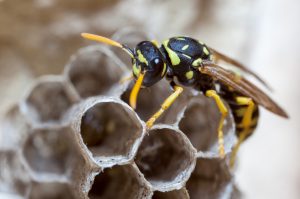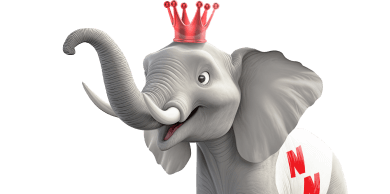What are the most common types of wasps found in Florida?
There are two species of wasps that are commonly found in Florida: the Cicada Killer Wasp and the Paper Wasp. Cicada killer wasps are larger in size with coloring similar to that of a yellow jacket, which causes much confusion for homeowners. Cicada killers are solitary wasps that use their venom to hunt and kill cicadas. As solitary wasps, they nest individually rather than living as a group. On the other hand, paper wasps are social so they live together in large colonies. As social wasps, they use their venom primarily for defense. Paper wasps, also known as the ‘sweets and meats’ wasps, are smaller in size with a reddish-brown coloration.
What do wasps and wasp nests look like?
Wasp species vary greatly in appearance and behavior but generally speaking most wasps have two wings, pinched waists, and pointed body segments. Social and solitary wasps differ in nesting behaviors, but more often than not wasps tend to make nests out of wood, paper, and their own saliva that are shaped like a honeycomb, usually brownish in color, and appear to have a paper-like texture.
Who is most at risk if stung by a wasp?
People who are allergic to wasp venom are most at risk if they are stung. If you do have an allergic reaction to a wasp sting you will show any of these symptoms: difficulty breathing, hives, lowered blood pressure, and swelling of the face, lips, throat or tongue. People who show any signs of an allergic reaction to a wasp sting can die from the sting within just one hour, so they should seek medical attention immediately. When in doubt, call 911, better safe than sorry!
When do wasps pose the greatest threat?
Understanding their seasonal cycle allows us to know in which months of the year that wasps pose the greatest threat to humans. Wasps create a new nest each spring, and their colony is at it’s largest in the late summer, and each winter most of the wasps in the colony will die off leaving just the fertilized queen who will find a warm place to hibernate until spring. Based on that information we know that wasps pose the greatest threat in the late summer months and through the fall season because wasps are active in the summer as they grow their colonies and then they become aggressive and frantic in the fall as their food sources dwindle and they began to die off.
Where do wasps typically live?
Wasps typically prefer to live in places with a warmer climate, however they can be found worldwide living in many various regions. Tropical regions such as South Florida differ from the other regions in that the warmer climate enables wasps to be problematic throughout the year. The only places that wasps do not live are in the Polar Regions because the climate is cold for the whole year making it uninhabitable for wasps.
Why should you be concerned about wasps?
Wasps only become a concern when they feel threatened, otherwise they won’t bother you. The biggest concern with wasps is that your children playing in the yard might go to close to a nest and accidently stir the wasps up. To make their yard a little safer for the kids, homeowners can check around their yard for wasp nests and remove any ones they find. For an even safer and more thorough option, homeowners can call Nozzle Nolen to schedule one of the treatments we provide that specifically target wasps and other stinging bugs.
Why are wasp stings so dangerous?
Wasp stings can be quite painful, but are rarely fatal. Their stings are dangerous because wasps’ stingers inject strong venom into their victims that usually causes an exaggerated pain sensation. Usually, symptoms from wasp stings go away within a week and only consist of minor swelling, itchiness, and pain at the site. Also, there is danger in the fact that wasps can sting you many times without dying, and these multi-sting attacks occur more often than you’d think.
Why do wasps sting people?
For humans, wasps’ stings are normally defensive actions meant to induce just enough pain to discourage us from going any closer towards them. Wasps will sting people multiple times whenever they feel threatened or scared.
How do you remove a wasp nest?
The safest option is to hire a pest control company to remove the nest for you. If you would rather try to remove it yourself, then you first have to kill the wasps living in the nests so that they won’t sting you when you knock the nest down. There all kinds of sprays that you can use to kill wasps, including homemade and all-natural ones, but the most effective kinds are the over-the-counter pesticide sprays. For safety reasons, do your best to limit any exposure to your kids or pets and try to keep the spray away from your face and skin as well. You should spray directly at the nest from a safe distance. The pesticide spray should kill the wasps within seconds and then you can use a long, sturdy pole to knock the nest down; they make ‘wasp wands’ for this purpose but you could also use a rake or large stick to get the job done.
DIY wasp control has the potential to be dangerous. If you have a bee or wasp problem in or around your South Florida home, please contact Nozzle Nolen. Our wasp control and bee removal services are available in Palm Beach Gardens, Tequesta, and West Palm Beach as well as elsewhere in South Florida.
To find out more about our wasp and bee services, click here.
Sources
Lamb, Robert. “How Wasps Work.” HowStuffWorks Animals. Infospace Holdings LLC, 30 Apr. 2008. Web. <http://animals.howstuffworks.com/insects/wasp3.htm>.
Lum, Steve. “Watch Out for Wasps: Florida’s Most Common Stinging Pests.” Slug-A-Bug. Slug-A-Bug Pest Control, 21 Aug. 2012. Web. <http://www.slugabug.com/2012/08/21/watch-out-for-wasps-florida%E2%80%99s-most-common-stinging-pests/>.
National Geographic Society. “Wasps, Wasp Pictures, Wasp Facts.” NationalGeographic.org. National Geographic Partners, LLC, 2015. Web. <http://animals.nationalgeographic.com/animals/bugs/wasp/>.
Ryan, Tom. “What Climate Do Wasps Live In?” Pets on Mom.Me. Whalerock Digital Media, LLC, 2016. Web. <http://animals.mom.me/climate-wasps-live-in-9780.html>.
“Wasps – Facts, Nest & Habitat Information.” Animal Corner. Animal Corner, 2016. Web. <https://animalcorner.co.uk/animals/wasps/>.





